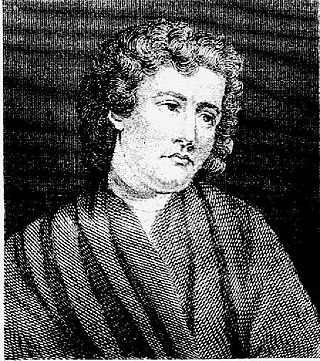
Eugene Aram is a melodramatic novel by the British writer Edward Bulwer-Lytton first published in 1832. It depicts the events leading up to the execution of Eugene Aram in 1759 for murdering his business partner. [1]

Eugene Aram is a melodramatic novel by the British writer Edward Bulwer-Lytton first published in 1832. It depicts the events leading up to the execution of Eugene Aram in 1759 for murdering his business partner. [1]
Lytton started the novel after having completed the first act of a play on the same subject, then dropping it in favour of what he considered the higher art form. This first act was then extended into a five-act play, giving proper credit to Lytton, by New Orleans poet Espy William Henricks Williams (30 January 1852 – 28 August 1908), and published 1873, shortly after publication by W. G. Wills of The Fate of Eugene Aram, [2] which has been performed (as Eugene Aram) in England and Australia. [3]
The novel was adapted three times for silent films, in 1914, [4] 1915 [5] and 1924. [6]

Edward George Earle Lytton Bulwer-Lytton, 1st Baron Lytton, PC was an English writer and politician. He served as a Whig member of Parliament from 1831 to 1841 and a Conservative from 1851 to 1866. He was Secretary of State for the Colonies from June 1858 to June 1859, choosing Richard Clement Moody as founder of British Columbia. A noted philhellene, Bulwer-Lytton was offered the Crown of Greece in 1862 after King Otto abdicated, but he declined. He was created Baron Lytton of Knebworth in 1866.

This article contains information about the literary events and publications of 1873.
This article contains information about the literary events and publications of 1848.
This article contains information about the literary events and publications of 1832.

Edward Robert Lytton Bulwer-Lytton, 1st Earl of Lytton, was an English statesman, Conservative politician and poet who used the pseudonym Owen Meredith. During his tenure as Viceroy of India between 1876 and 1880, Queen Victoria was proclaimed Empress of India. He served as British Ambassador to France from 1887 to 1891.

Earl of Lytton, in the County of Derby, is a title in the Peerage of the United Kingdom. It was created in 1880 for the diplomat and poet Robert Bulwer-Lytton, 2nd Baron Lytton. He was Viceroy of India from 1876 to 1880 and British Ambassador to France from 1887 to 1891. He was made Viscount Knebworth, of Knebworth in the County of Hertford, at the same time he was given the earldom, also in the Peerage of the United Kingdom.

Eugene Aram was an English philologist, but also infamous as the murderer celebrated by Thomas Hood in his ballad The Dream of Eugene Aram, and by Edward Bulwer-Lytton in his 1832 novel Eugene Aram.

William Henry Lytton Earle Bulwer, 1st Baron Dalling and Bulwer GCB, PC was a British Liberal politician, diplomat and writer.
Nationality words link to articles with information on the nation's poetry or literature.
Nationality words link to articles with information on the nation's poetry or literature.
Events from the year 1873 in the United Kingdom.
The Newgate novels were novels published in England from the late 1820s until the 1840s that glamorised the lives of the criminals they portrayed. Most drew their inspiration from the Newgate Calendar, a biography of famous criminals published during the late 18th and early 19th centuries, and usually rearranged or embellished the original tale for melodramatic effect. The novels caused great controversy, and drew criticism in particular from the novelist William Makepeace Thackeray, who satirised them in several of his novels and attacked the authors openly.

Rosina Bulwer-Lytton, Baroness Lytton, was an Anglo-Irish writer who published fourteen novels, a volume of essays, and a volume of letters.
Eugene Aram was an English philologist, convicted of murder and hanged in 1759.
Eugene Aram is a 1924 British silent drama film directed by Arthur Rooke and starring Arthur Wontner, Barbara Hoffe and Mary Odette. It was based on the 1832 novel Eugene Aram by Edward Bulwer-Lytton which depicts the life of the eighteenth century criminal Eugene Aram.
Eugene Aram is a 1914 British silent drama film directed by Edwin J. Collins and starring Jack Leigh, Mary Manners and John Sargent. It was adapted from the 1832 novel Eugene Aram by Edward Bulwer-Lytton.
Lytton is a surname. Notable people with the surname include:

Isa or Isabella Jane Blagden was an English-language novelist, speaker, and poet born in the East Indies or India, who spent much of her life among the English community in Florence. She was notably friendly with the Browning, Bulwer-Lytton and Trollope families.
Eugene Aram is a 1915 American silent historical film directed by Richard Ridgely and starring Marc McDermott, Mabel Trunnelle and Gladys Hulette. It is an adaptation of the 1832 novel Eugene Aram by Edward Bulwer-Lytton.

Thomas Hay Sweet Escott was an English journalist and editor.